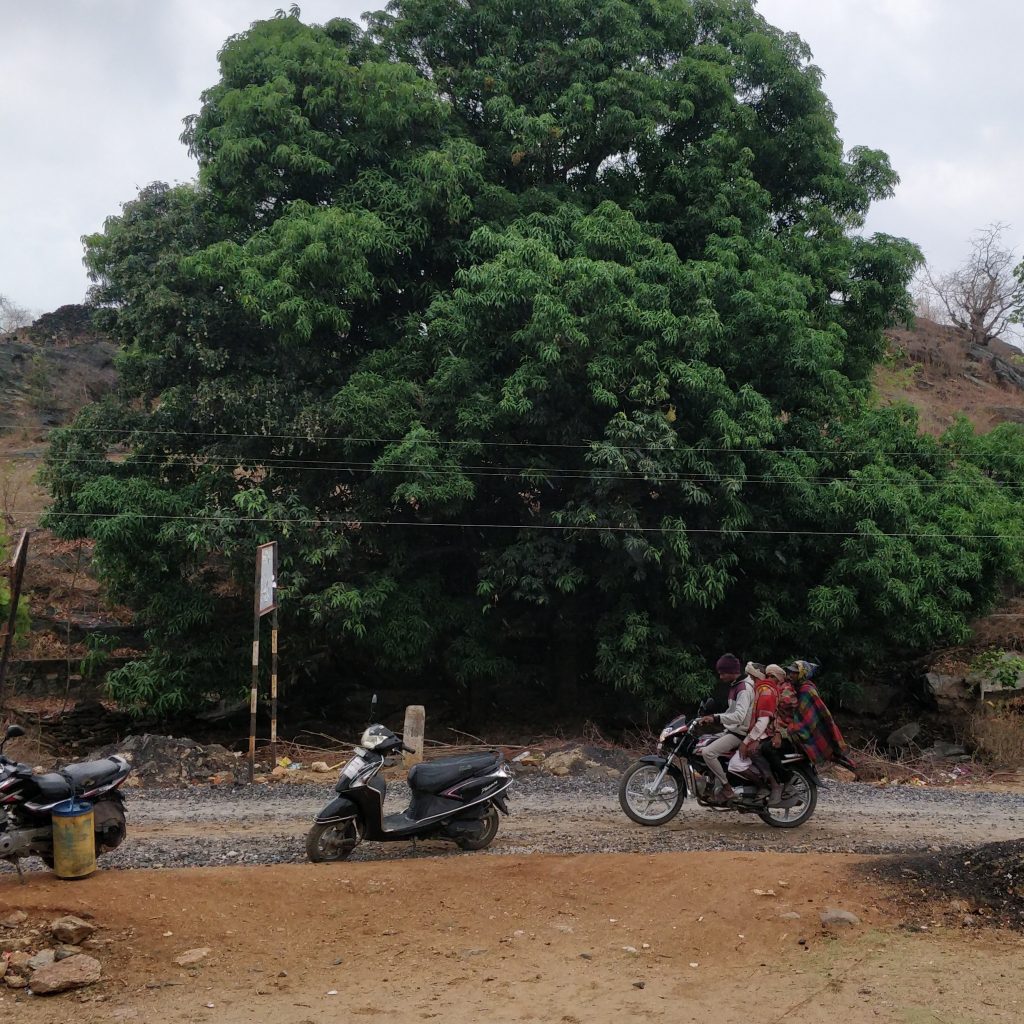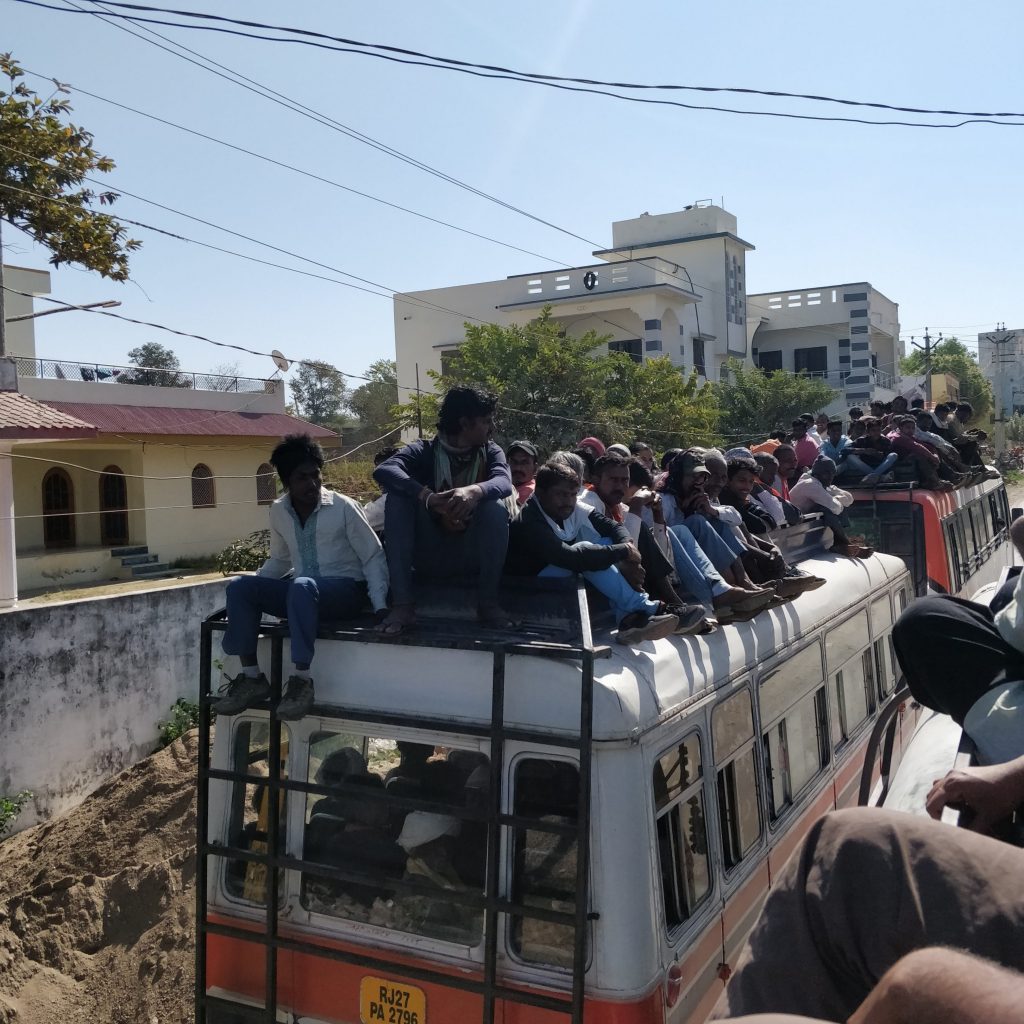As I work with Shram Sarathi in Gogunda block of Udaipur, Rajasthan, if I have to talk about the most epic ways of local commute, I’ll tell you this…
The field areas, though accessible through public transport, still require one to navigate a few kilometres on foot, after the jeep or the bus would drop them, to reach the interior villages and hamlets. “Abhi kuch din ke liye rehne do. Akele mat jao, kisi ke sath hi jana.” I was very clearly instructed to not take the public transport initially as everyone felt accountable for this new team member who had come from the city. However, as time passed by, I observed a few pitfalls in this arrangement.
These are some images of the modes of transport available to majority of the people here. Jeeps, local buses – both private and government ones, privately owned bikes and cars rarely spotted, usually on the highway.

Jeep overstuffed mostly with male passengers 
4 people on a bike 
Sitting on top of the local bus
As an independent woman who had not faced any issues with moving around earlier, I felt constricted. I was used to travelling alone in the city, never restricted by ‘rules’ like curfew timings at home or by ‘means’ like availability of public/private transport or lack of resources to pay for the fare. In the last few months I observed women in our community and their mobility patterns – some travelled independently in public transport while others were accompanied by a male family member. Most of them have to seek permission from their husbands or male members in the house to step out and their frequency of travel was restricted by the amount of ‘paya‘ (paisa) in their hands.
As I sat one day, navigating this issue at work, I realised what mobility meant to me – something I had never paid much attention to. I also inevitably drew a lot of parallels between my situation and that of the women in rural areas and tried to make a little more sense of their relationship with mobility.
Travelling alone was one of those few opportunities of ‘me-time’ that I enjoyed since I started moving independently. I would purposefully walk back two kilometres from the metro station to my home every day while in college.
After getting a scooter from the organization here, I felt relieved. Being able to move alone freely was empowering. It gave me the time and space to disconnect from everything else and focus on my thoughts without feeling guilty about taking time out of my ‘productive hours’. Conditioned by the system to constantly perform, finding time for myself to reflect was important. This gave me time off core tasks and a necessary breather once in a while.
I then wondered if women who are restricted in their environment due to mobility issues feel stuck in their daily grind, not getting a chance to think deeply or reflect.
Contrary to the argument of having time off, being under pressure (self-assumed or inflicted) and the inability to move freely, in fact, decreased my productivity. The stress of not being able to get things done as per my plans made me feel crippled.
I wonder then, if a woman from the rural community feels the same kind of frustration from being dependent on others for her requirements. Does this frustration emanating out of the high level of dependence on others then leads to a sense of reduced agency and creativity over a period of time?
Travelling, though now more convenient, wasn’t something I looked forward to, eagerly. Not having access to transportation initially made me feel less confident to travel alone. The unfamiliarity made me sceptical about visiting these places on my own, like the jittery feeling one gets before an exam. I realised that this might lead to a tendency to forgo opportunities of independent mobility.
I began to think then, does a girl who has never visited a town all by herself feels a sense of getting ‘lost’. Do her aspirations and self-confidence die a slow death?
For me, travelling is being able to visually absorb the landscape, the people and cultural aspects. These visuals come back to me at different points of time, revisiting what I thought or felt in those moments, each time taking something unique out of that experience. I imagine it as one of the best ways to seek not only what is apparent but also really reflect on it. What could be a better way to learn?
If mobility is a precursor to ‘exposure’, does lack of access to it then handicap the process of learning from perceiving? On whom is the onus of ensuring the flow of information or knowledge to a woman who lives in the interiors of a village with limited access to transportation?
When we talk of policies like special buses for women, pink metro coaches, subsidised bus rides or even separate ticket counters for women passengers, it is first important to understand what we are really trying to do. Is assigning five seats to women in a bus going to make them commute more? Will subsidised fares encourage women to travel? Maybe not, but it might make them more confident and comfortable in occupying those public spaces. Maybe their economic circumstances will not be a hindrance to mobility during emergencies. Many argue about the economic costs of such positively discriminatory policies. I would, in fact, argue why we are still only focusing on reserving public transportation primarily with a focus on urban areas.
The need to keep rural women and their mobility at the forefront of solving transportation challenges is evident. Women in rural areas have access to a limited options, most of which require the presence of a male member with them. There is especially stronger case for more inclusive transportation since we are still in the phase of setting up a major portion of this infrastructure in rural areas in the form of – special buses and routes for women depending on their schedules and priority locations, and reducing the information asymmetry by making information about timings, etc. more accessible.
Mobility and agency of women in rural areas should be looked at as an economic opportunity in the long term – a means to possibly prevent severe social costs such as deteriorating mental health and general well-being.







0 Comments